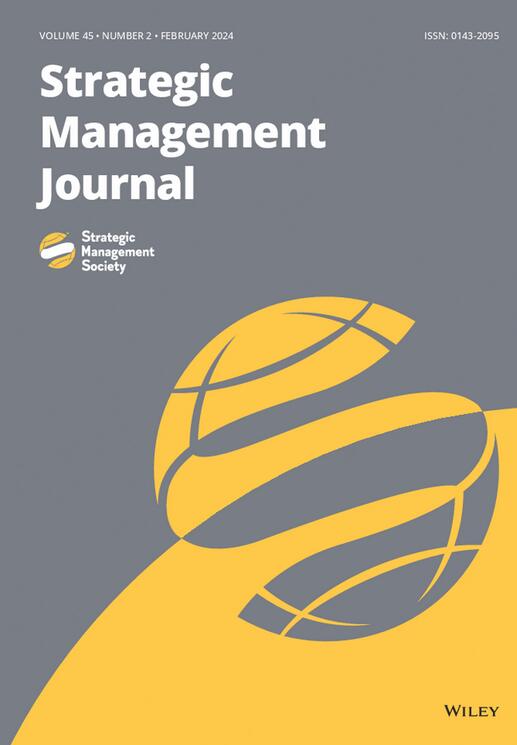The new needs friends: Simmelian strangers and the selection of novelty
IF 7.2
1区 管理学
Q1 BUSINESS
引用次数: 0
Abstract
Abstract Research Summary The paradox of rejecting novel ideas while being motivated to select them exists in many realms. Deviating from prior research that investigated several internal levers to promote the funding of novel ideas in the sciences, we focus on an external lever by investigating how seconded employees increase the selection of novel ideas in two ways: (1) they select more novel ideas themselves, and (2) they influence permanent employees to do the same. Combining unique quantitative longitudinal data and 37 in‐depth interviews, we test our predictions in the secondment program at the National Science Foundation and find broad support for our theoretical arguments. Our findings have implications for scholars of science and innovation by proposing a relatively light‐touch intervention to facilitate the selection of novel ideas. Managerial Summary Organizations often face a paradox: they want to select novel ideas but tend to reject them. This study shifts focus from internal measures to an external solution, examining how seconded employees can help. Through both quantitative data and interviews at the National Science Foundation's secondment program, we found that seconded employees choose more novel ideas and influence permanent staff to do the same. This suggests a simple intervention can significantly boost the acceptance of innovative ideas, offering valuable insights for those in the science and innovation. Understanding this dynamic can empower managers to strategically leverage seconded employees, fostering a more innovative and adaptive organizational culture.新人需要朋友:Simmelian陌生人和对新奇事物的选择
在许多领域都存在着拒绝新想法而又有动力选择新想法的悖论。之前的研究调查了几种内部杠杆来促进科学中新颖想法的资助,我们通过调查借调员工如何通过两种方式增加新颖想法的选择来关注外部杠杆:(1)他们自己选择更多的新颖想法,(2)他们影响正式员工也这样做。结合独特的定量纵向数据和37个深度访谈,我们在国家科学基金会的借调计划中测试了我们的预测,并为我们的理论论点找到了广泛的支持。我们的研究结果对科学和创新学者具有启示意义,我们提出了一种相对轻触的干预方法,以促进新想法的选择。组织经常面临一个悖论:他们想要选择新颖的想法,但又倾向于拒绝它们。这项研究将重点从内部措施转移到外部解决方案,研究借调员工如何提供帮助。通过定量数据和对美国国家科学基金会借调计划的访谈,我们发现借调员工会选择更多新颖的想法,并影响正式员工也这样做。这表明,一个简单的干预可以显著促进创新思想的接受,为科学和创新领域的人提供有价值的见解。了解这种动态可以使管理者能够战略性地利用借调员工,培养更具创新性和适应性的组织文化。
本文章由计算机程序翻译,如有差异,请以英文原文为准。
求助全文
约1分钟内获得全文
求助全文
来源期刊

Strategic Management Journal
Multiple-
CiteScore
13.70
自引率
8.40%
发文量
109
期刊介绍:
At the Strategic Management Journal, we are committed to publishing top-tier research that addresses key questions in the field of strategic management and captivates scholars in this area. Our publication welcomes manuscripts covering a wide range of topics, perspectives, and research methodologies. As a result, our editorial decisions truly embrace the diversity inherent in the field.
 求助内容:
求助内容: 应助结果提醒方式:
应助结果提醒方式:


